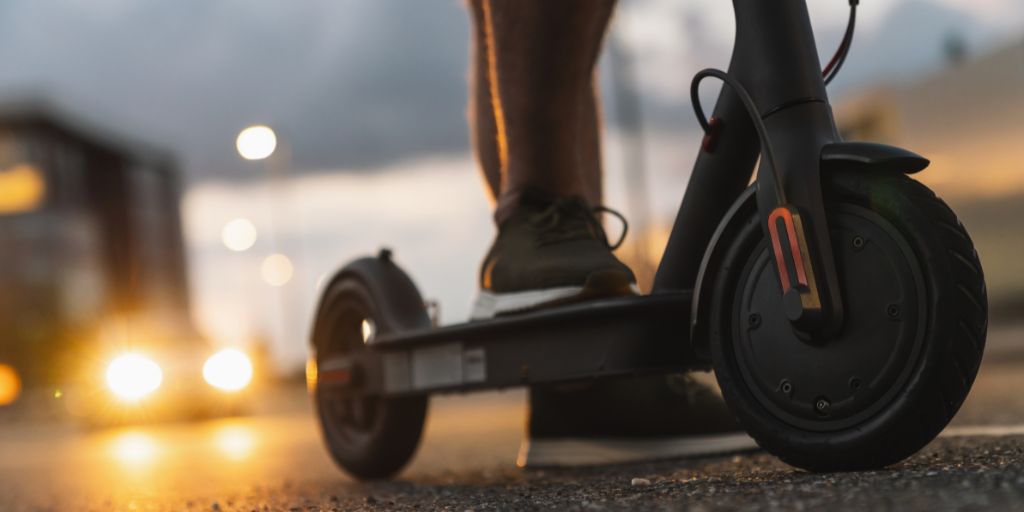Riding the Risk: Micromobility in Personal Injury


We have all been there: you’re standing at a set of traffic lights waiting to cross the road. The green man appears, and you take your first step. Out of the corner of your eye you see an e-scooter hurtling towards you at speed with an apparent disregard to the red light for road traffic. Luckily, you manage to get yourself back onto the pavement quickly and the e-scooter flies past. You avoid a collision, but it was close.
The upward trend in collisions involving micromobility is an unfortunate but real side effect of the widespread availability and use of e-scooters and e-bikes. The speeds involved in these collisions and heavy weights of the equipment can cause serious and lasting injuries to pedestrians.
E-Scooters
Only e-scooters used through an approved rental scheme, such as Lime, Dott, and Voi, are allowed on public roads in England and Wales. The schemes are usually limited to certain metropolitan areas, often in bustling city centres. The important aspect to these schemes is that they require the rental companies to have in place adequate third-party insurance for the individuals riding the scooters. This means that if a rider causes a collision resulting in an injury due to negligent riding, they are insured against the damages and legal costs arising from a claim.
If you are involved in a collision, it is important that you or a bystander make note of the following information:
- The date and time of the accident.
- The location of the accident.
- The name of the approved rental scheme company.
- The e-scooter’s registration or identification number.
- The name and address of the rider.
Obtaining this information will assist your solicitor in identifying the correct insurance company. This information will also enable the insurer to identify the individual riding the scooter if you have been unable to do so yourself. The majority of approved schemes use GPS tracking, meaning that if you are able to show the insurer where and when the accident occurred, they may be able to corroborate your claim with GPS data and locate the rider’s details.
Interestingly, from my own practice, some insurers are based outside of England and Wales. This unfortunately means that the insurer’s case handlers are not always aware of our domestic legal system. It is therefore vital that you instruct a solicitor to represent you in these claims as they will be able to explain the complexities of the English and Welsh legal system to any insurer. This will avoid the incorrect application of foreign personal injury law which could result in you under settling your claim.
In circumstances where the Defendant rider was using a personal e-scooter, it is unlikely that they will be insured. This is due to the fact that the majority personal e-scooters are illegal to ride on public roads and so insurance for them is not available. This means that any claim would need to be brought against the rider personally. Unfortunately, this can be complex and there is no guarantee that the individual will have sufficient assets to cover damages and legal costs. That being said, you may be able to bring a claim under the Criminal Injuries Compensation Authority as you could be considered a victim of a violent crime.
E-Bikes
The position for e-bikes is slightly different. Most e-bikes are legal to use on public roads and so riders may be able to obtain insurance. If you are involved in a collision with a personal e-bike, it is vital that you take the details of the rider or contact the Police at the earliest opportunity so they can commence an investigation. This will give you the best chance in obtaining those vital insurance details and assist your solicitor in brining your claim. E-bikes that are used under an approved rental scheme are also insured in the same way as e-scooters.
Conclusion
If you are involved in an accident involving a form of micromobility, it is important that you seek advice from a solicitor so they can consider the viability of your claim. Call our personal injury team on 020 7940 4060 or send us an email at mail@anthonygold.co.uk, if you wish to discuss making a claim.
Please note
The information on the Anthony Gold website is for general information only and reflects the position at the date of publication. It does not constitute legal advice and should not be treated as such. It is provided without any representations or warranties, expressed or implied.

Related Insights
- February 9, 2023
A Case Study of a Road Traffic Accident
- February 15, 2022
Cyclists and Pedestrians – New Highway Code Rules
Our Latest Injury & Medical Claims Insights
- February 13, 2026
Contributory negligence in clinical negligence – A recent case
- February 13, 2026
The difficulty of brief medical records and AI
- December 11, 2025
How to obtain interim payments in personal injury and medical negligence claims
- December 11, 2025
£500,000 settlement for injured jogger after serious road accident
- December 11, 2025
The value of interim payments in personal injury and medical negligence claims
- October 6, 2025
Jess’s Rule – a welcome reminder to reconsider persistent symptoms
Latest Articles
View allInsights: February 13, 2026
Insights: February 13, 2026
Insights: February 12, 2026
Make a payment
Contact the Conveyancing team today
Contact us today
"*" indicates required fields
Contact the commercial
& civil Dispute team today
"*" indicates required fields
Contact the Conveyancing team today
Contact the Conveyancing team today
Contact the Wills, Trusts
& Estates team today
Contact the Court of
Protection team today
Contact the Employment Law team today
Contact the Clinical Negligence team today
Contact the Family & Relationships team today
Contact the Personal Injury Claims team today
Contact the leasehold & Freehold team today
Contact the Corporate & Commercial team today
Contact the housing & disputes team
"*" indicates required fields
































